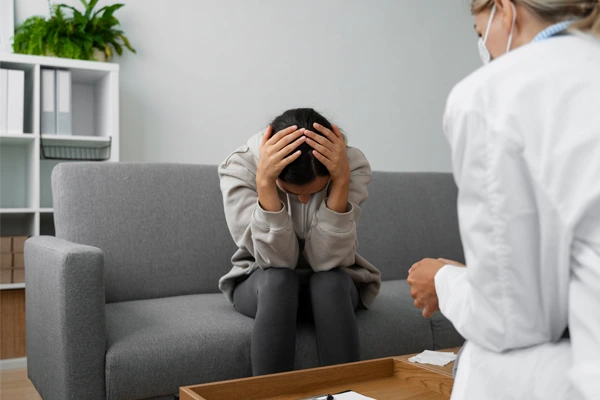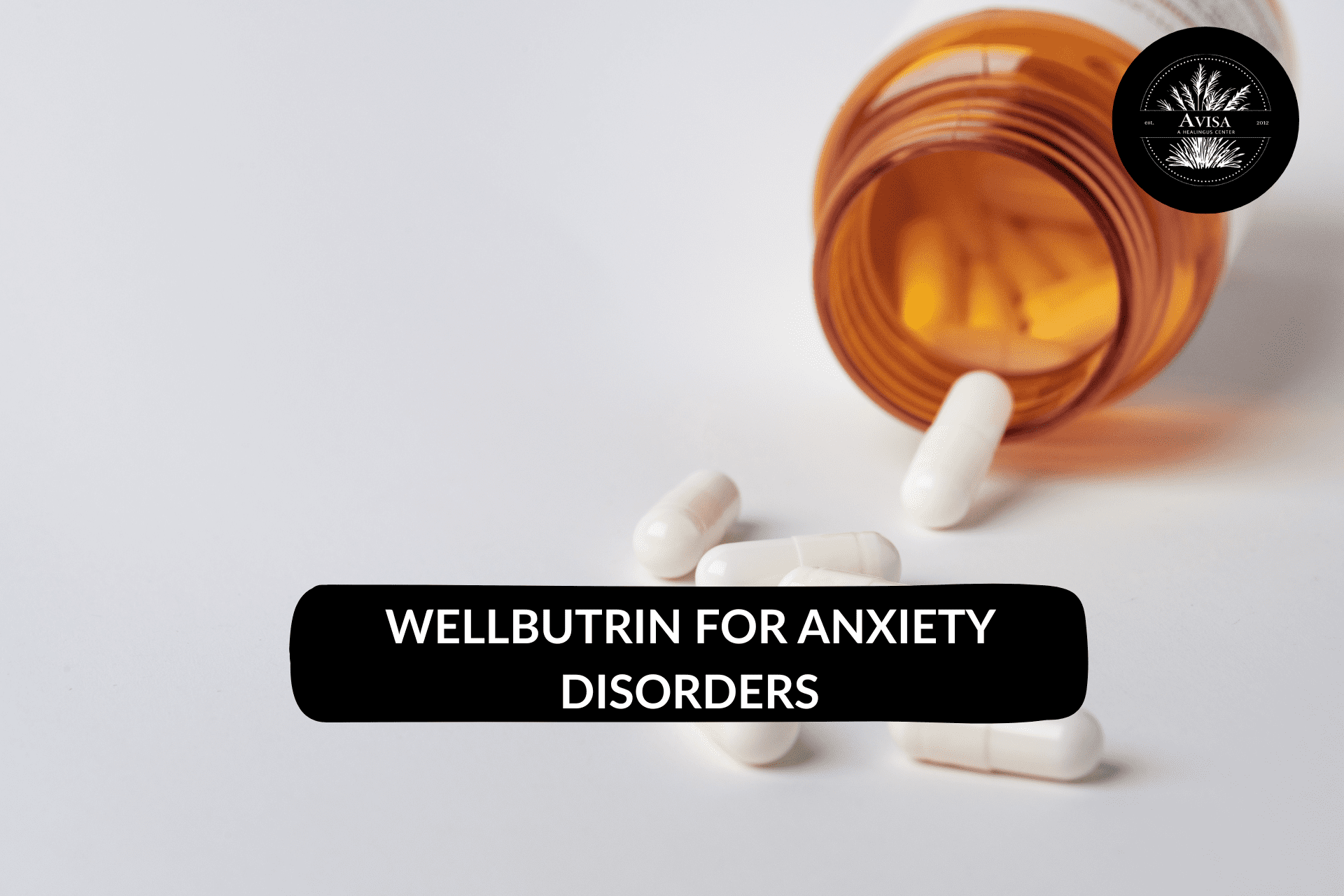Inpatient anxiety treatment can be a real lifesaver for those dealing with severe anxiety that’s tough to handle. With over 40 million adults affected with anxiety, inpatient anxiety treatment is being widely trusted by people. Anxiety is a natural, biological response to a perceived threat, and what if the symptoms you’ve been ignoring for years are actually signs of something deeper? The unsettling truth is- it will cure on its own, but remember, not in every case. You need to take care of yourself by taking medication, therapy, or Inpatient anxiety treatment.
Anxiety manifests in various ways, leading to physical, emotional, behavioral, and cognitive symptoms and signs. Ashley and Frank Salvage, in a podcast, share their arduous journey with smoking and other addictions, showing how anxiety played a role. Frank tried several treatment centers but found success through personal commitment and one-on-one therapy. His story highlights how good treatment and support can really help. Now sober for almost a year, Frank shows how hard it can be to quit and the importance of tackling anxiety for lasting recovery.
This blog covers inpatient anxiety treatment, highlighting its benefits and what to expect during your stay. Learn how this structured care can help manage anxiety and support your recovery journey.
Tired of battling anxiety alone?
Understanding Inpatient Anxiety Treatment
Feeling anxious now and then is normal, but for some, anxiety doesn’t go away. It can linger and make life feel tougher than it should be. Anxiety shows up in different ways—some worry about everyday things, while others suddenly feel panic or fear. The causes can vary, including genetics, where anxiety disorders can run in families, or environmental factors, such as going through a stressful event like abuse, the loss of a loved one, or a severe illness.
If anxiety becomes overwhelming and affects daily life, inpatient anxiety treatment can be an effective solution. This type of treatment provides a structured environment where individuals can focus on their mental health without distractions. Inpatient care offers support from professionals and a chance to learn coping strategies that can lead to long-term recovery. Recognizing the need for help is a crucial step toward feeling better. In a review of nine studies involving over 2,700 patients in psychosomatic-psychotherapy units, researchers found that inpatient treatment led to significant improvement for about two-thirds to three-quarters of patients. These treatments lasted an average of 42 to 97 days and showed positive results across various measures.
The goal of inpatient anxiety treatment is to provide a safe and supportive environment that encourages healing. It also aims to give people the tools and techniques they need to manage their anxiety effectively.
Long-Term Benefits of Inpatient Anxiety Treatment
Inpatient anxiety treatment can offer many long-term benefits, including:
-
Structured Environment
A daily schedule helps patients build healthy habits and routines, promoting stability and responsibility.
-
Improved Coping Skills
Patients learn to identify what triggers their anxiety, understand its causes, and develop strategies to manage it.
-
Reduced Risk of Relapse
A structured setting can lower the chances of relapse and the need for hospitalization.
-
Better Quality of Life
Patients gain skills to lead fulfilling lives after they leave the facility.
-
Access to Treatments
Inpatient care provides treatments that may not be available at home or in outpatient settings.
-
Support System
Patients can connect with others facing similar challenges, building a supportive community.
While inpatient programs are among the most intensive forms of treatment, their effectiveness can depend on various factors like type of anxiety, age or past medical history.
What to expect during your Inpatient Anxiety Treatment stay?
When you stay in an inpatient anxiety treatment facility, expect a structured schedule with round-the-clock care. You’ll participate in individual and group therapy sessions, receive medication management if needed, and follow a personalized treatment plan. The focus will be on learning coping mechanisms and relaxation techniques to help manage your anxiety in a safe, supportive environment.
Most stays in inpatient clinics typically last between 3 to 7 days, starting with an assessment to understand your specific needs. However, the standard treatment duration may extend to at least eight weeks or more for some patients, especially those with more complex disorders.
Here are some key aspects of what you can expect:
-
Intake and Assessment
You’ll undergo a thorough evaluation of your anxiety symptoms, medical history, and current life situation. This helps create a tailored treatment plan just for you.
-
Individual Therapy
You’ll have one-on-one sessions with a therapist to talk about your specific anxieties and work on coping strategies.
-
Group Therapy
You’ll join sessions with others experiencing similar anxieties, allowing you to share experiences and learn from one another.
-
Medication Management
If necessary, you’ll work with a psychiatrist to adjust your medication to manage your anxiety better.
-
Relaxation Techniques
You’ll learn practices like deep breathing, mindfulness meditation, and progressive muscle relaxation to help manage anxiety symptoms.
-
Exposure Therapy
You may gradually face situations that trigger your anxiety in a controlled setting to help lessen your response over time.
-
Cognitive Behavioral Therapy (CBT)
You’ll work on identifying and changing negative thought patterns that contribute to your anxiety.
-
Holistic Therapies
Some facilities include activities like yoga, art therapy, or physical exercise to enhance your overall well-being.
-
Aftercare Planning
Before leaving, you’ll collaborate with your treatment team to develop a plan for managing your anxiety post-treatment, which may include outpatient therapy or support groups.
It’s also important to remember a few key points during your inpatient anxiety treatment:
- Your privacy is protected throughout your treatment.
- Feel free to share your concerns and feelings openly with your therapists and healthcare team.
- Engaging in therapy sessions and practicing the skills you learn is essential for successful treatment.
This structured approach makes sure you receive the support you need to manage your anxiety effectively.
Tired of fighting addiction and mental health struggles?
Ignoring both deepens the struggle. Our holistic approach—detox, therapy, and medication-assisted treatment—can help you heal. Take the first step today.
FAQs: Inpatient Anxiety Treatment
Q: How to overcome depression and anxiety?
A: To overcome depression and anxiety, try exercising for 15 to 30 minutes daily, eating healthy foods, and staying hydrated. Express your feelings, focus on the positive, and avoid dwelling on problems.
Q: What is the best treatment for anxiety?
A: The best treatment for anxiety usually combines therapy and medication. While medications can’t cure anxiety, they can help reduce symptoms. Antidepressants are often used for this purpose.
Q: What is inpatient anxiety treatment?
A: Inpatient anxiety treatment involves staying at a facility to receive support for anxiety. Patients engage in therapies, both individual and group, in a structured environment with constant care.
Q: How can I fight anxiety?
A: You can fight anxiety by learning about it, practicing relaxation techniques, exercising, eating well, and building self-esteem. Cognitive therapy and support groups can also be helpful.
Q: What are the 5 symptoms of anxiety?
A: Common anxiety symptoms include trouble concentrating, feeling restless, nausea, heart palpitations, and sweating. Other signs are difficulty sleeping and a sense of panic.
Conclusion
If you or someone you care about is struggling with anxiety that’s disrupting daily life, it’s important to seek help. Inpatient anxiety treatment can provide the support needed to manage these challenges.
During inpatient anxiety treatment, you’ll find a welcoming environment where you can connect with others facing similar struggles. You’ll have access to various treatments, including medications, talk therapies like CBT or DBT, individual and group counseling, family therapy, and holistic approaches.
Reaching out for help can genuinely change your life. You don’t have to face anxiety alone. Support is available, and you deserve to feel better.











